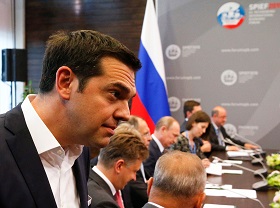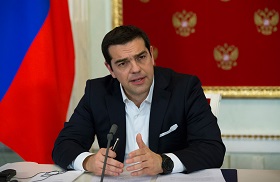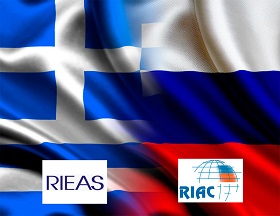Analyzing one by one the important aspects of Vladimir Putin’s official visit to Greece that will shape the future of Greek-Russian relations, we should take into account – a minimum of – two restrictions. Firstly, there is a restriction that covers every theme related to International Politics: it’s called realism, so we should draw a line separating the feasible from the aspirational. Secondly, it is necessary to specify the sectors in which both states could cooperate. The more general cooperation is, the more difficult it is to achieve in real politics.
Analyzing one by one the important aspects of Vladimir Putin’s official visit to Greece that will shape the future of Greek-Russian relations, we should take into account – a minimum of – two restrictions. Firstly, there is a restriction that covers every theme related to International Politics: it’s called realism, so we should draw a line separating the feasible from the aspirational. Secondly, it is necessary to specify the sectors in which both states could cooperate. The more general cooperation is, the more difficult it is to achieve in real politics. After all, there are special circumstances that support Greek-Russian relations. This type of special relationship creates a beyond inter-state friendship between the two countries. However, momentum is severe and crucial for both countries and in general, for the wider region of the Mediterranean Sea. Which are the sectors of cooperation that the two states could employ to boost their partnership? Do the restrictions create obstacles for a potential strategic partnership?
Focus on Geopolitics
Greece is a key-state in the Mediterranean Sea. Since 2010, Greece has strengthened its ties with Cyprus, Israel and Egypt. All these states are trying to build up multilateral cooperation in the Mediterranean region.
The Russian Federation has already boosted its ties with Cyprus, Israel and Egypt. The Syrian issue and its connection to ISIS have driven the whole region into turmoil. The refugee crisis has not abated and Turkey is behaving unproductively. The presence of the Russian Navy in the Eastern Mediterranean combined with the presence of NATO help establish a model of “Peace through Strength,” and while dialogue between the Russian Federation and the USA is alive and kicking despite their different interests. Being a NATO-member state, Greece is useful for the Russian Federation, and President Putin is well aware of this.
The hostile relations between Moscow and Ankara are another reason that Russia desires a more productive relation with Greece. Turkey is trying to turn down the US-Russian dialogue about Syria, hoping that its membership in NATO might turn it against Russia. Voices from both the USA and Russia recognize that the common threat is the expansion of ISIS. Athens could be a normalizing power between NATO and Russia.
Economic Sanctions and the EU
The EU should search for tools to communicate with Russia and put an end to the deterioration of EU-Russian relations. Russia has many reasons to keep its relations with Greece warm because Greece (among other EU-member states) still believes that the EU has to end the sanctions against Russia. Greece and Cyprus could build bridges to normalize EU-Russian relations in order to restart the dialogue over their differences on the issue of Ukraine. The EU should take into deep consideration that it does have the time to continue the “mini-riots” with Russia. The Political Declaration on the Greek-Russian dialogue concerning international and regional issues that President Putin agreed to with the Greek Government is a positive first step to address all the above matters.
Greek-Russian Economic Relations
Russia is interested in acquiring Greek railways and the port of Thessaloniki. However, national and E.U. restrictions make some of these agreements difficult, if not improbable. In any case, the two countries should seize the opportunities of new investment projects, a perspective that is more positive after the agreement between “Enterprise Greece” and “Invest in Russia”. As regards to the tourism sector, Greece is now the first choice among tourists and the Greek consular authorities should expedite the issuance of visas to Russian citizens.
In the energy sector, the implementation of Southstream II and ITGI natural gas pipelines was hurt after the signing for the construction of Trans Adriatic Pipeline (TAP). Despite this fact, if Russia-EU relations do improve in the future, we should not exclude potential energy projects, as long as they comply with the principles of the E.U.’s Third Energy Package. Moreover, the agreement between Hellenic Petroleum Company (ELPE) and Rosneft and the cooperation of the Greek Centre for Renewable Energy Sources and the Russian Institute of Energy create mutually beneficial relations and extend the prospects for future energy projects.
The Religious Dimension
The visit of President Putin to Mount Athos gave a positive first signal to strengthen the religious dialogue between the Constantinople and Moscow patriarchates. Despite the issue of property disputes, there is a chance of convergence of views. Religious diplomacy is acquiring great importance at a time when religious fundamentalism prevails and Christians in the Middle East are persecuted. The Holy Synod (Pan-Orthodox) to be held in Crete in June is a great opportunity that could give a new impetus to the Orthodox Church.
In conclusion, President Putin’s visit in Greece marks the beginning of a new diplomatic relationship between Russia and Greece, which can flower in many areas of interest to both countries. At the same time, through the diplomatic mediation of Greece, the political dialogue between both Russia-EU and Russia-USA can improve, thus contributing to the stability of the new multipolar world that is emerging in our time.







